EV Smart energy management systems are crucial in driving the EV revolution. These systems are designed to optimize energy usage, reduce carbon emissions, and improve the overall efficiency of the power grid.
Revenue in the Energy Management market is projected to reach US$10.0bn in 2024. Revenue is expected to show an annual growth rate (CAGR 2024-2028) of 10.75%, resulting in a projected market volume of US$15.1bn by 2028.
Integrating smart energy management systems into EV charging infrastructure ensures that EVs are charged in the most cost-effective and environmentally friendly way possible.
This approach helps balance energy demand across the grid and supports a more sustainable energy future.
By leveraging advanced EV energy management system components, we can optimize charging processes and enhance overall efficiency.
In this blog, you will see how intelligent energy management is accelerating the EV revolution and reshaping our approach to energy consumption.
An EV smart energy management system is a technology framework designed to optimize electric vehicles’ charging and energy consumption.
It intelligently manages when and how EVs are charged to minimize costs and reduce carbon emissions, often integrating with the power grid to balance energy demand.
By using real-time data and advanced algorithms, these systems ensure efficient energy use, support grid stability, and promote sustainability, ultimately enhancing the overall effectiveness of electric vehicle energy management systems.
Maximizing energy resources for EV charging involves several strategies:
Use smart chargers that are part of an energy management system in electric vehicles, adjusting charging times based on grid demand and energy rates.
This strategy ensures that EVs charge during off-peak hours, reducing costs and lessening strain on the grid.
Incorporate battery storage systems in electric vehicles’ energy management system to store excess energy during low-demand periods.
This stored energy can be used for EV charging when needed, smoothing energy supply and demand.
Pair EV charging with renewable energy sources like solar or wind to minimize reliance on fossil fuels. An energy management system in electric vehicles can help integrate these renewable sources efficiently, reducing overall carbon emissions.
Participate in demand response programs through the energy management system in electrical vehicles.
Adjust EV charging based on real-time energy availability and grid conditions, which supports overall grid stability and optimizes energy usage.
Invest in high efficiency charging equipment and infrastructure. An advanced EV smart energy management system ensures that energy is used effectively and that charging stations operate at optimal performance.
Enable V2G systems as part of the EV smart energy management, allowing EVs to return stored energy to the grid. This helps balance supply and demand, providing additional support for grid stability.
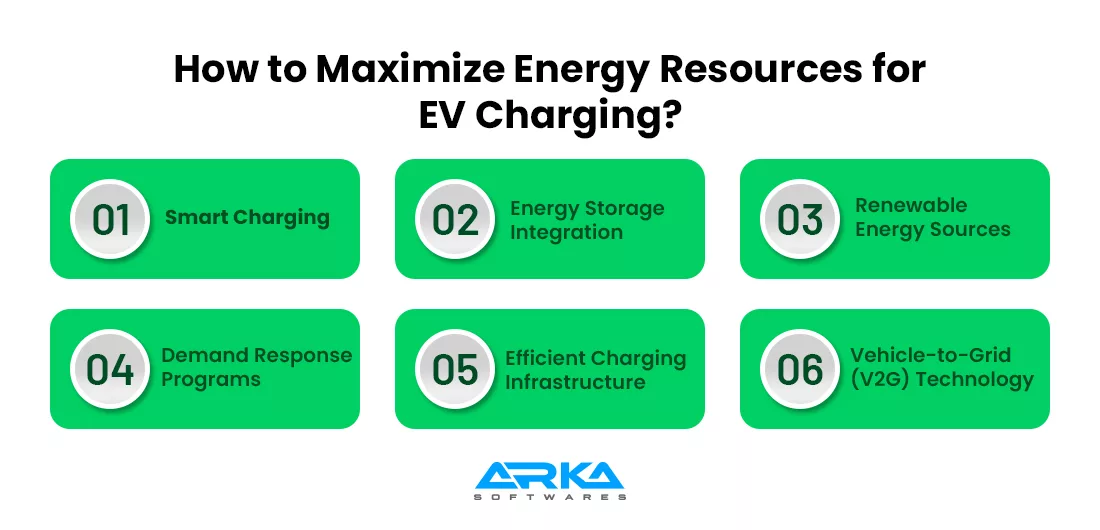
The widespread adoption of electric vehicles (EVs) faces several challenges; despite their growing popularity, environmental benefits and energy management solutions come across. Here are some of the key challenges:
The availability and accessibility of charging stations is a problem. While public and private investment is expanding charging networks, the infrastructure still needs to be more widespread and reliable to support long-distance travel and urban usage.
EV Smart energy management solutions for EV charging are crucial in optimizing available infrastructure and ensuring efficient energy use.
Although battery technology has advanced, issues such as range anxiety—concern about running out of battery before reaching a charging station—persist.
Improving battery range and reducing charging times are crucial for broader adoption. Effective energy management for EV can help maximize battery performance and extend range through innovations in battery technology and charging efficiency.
The upfront cost of EVs can be higher than traditional internal combustion engine vehicles, primarily due to the cost of batteries.
While prices are decreasing and incentives can help, the initial expense remains a barrier for some consumers.
EV Smart energy management strategies can help reduce ownership costs by optimizing energy use and integrating renewable energy sources.
The overall environmental benefit of EVs depends on how the electricity used to charge is generated. If the grid relies heavily on fossil fuels.
Additionally, increased demand for electricity due to widespread EV adoption could stress existing power grids and require upgrades.
Energy management for EV is essential to balance load demands and integrate renewable energy sources into the grid.
The production of EV batteries relies on materials like lithium, cobalt, and nickel, which can be scarce and have environmental and ethical concerns associated with their mining.
Incorporating EV smart energy management practices can mitigate some of these concerns by improving battery efficiency and lifecycle management.
EVs require different maintenance and repair skills compared to traditional vehicles. The industry needs to adapt to these changes, and the availability of trained technicians and parts can be a concern.
EV Smart energy management in maintenance practices can help optimize vehicle performance and extend the lifespan of components.
There is still a need for a greater public understanding of EVs, including their benefits, maintenance, and available incentives. Misconceptions and lack of information can deter potential buyers.
Educating consumers about energy management for EV can enhance their understanding of how these vehicles work and the advantages of optimized energy use.
The regulatory environment can significantly impact EV adoption. Policies and incentives can vary widely between regions, and changes in regulations or the removal of subsidies could affect the market. EV Smart energy management policies can shape how EVs are integrated into national and local laws.
The resale market for EVs is still developing. As the number of EVs on the road increases, the second-hand market will need to grow and evolve to meet demand and provide buyers with good options.
Effective energy management for EVs can enhance the appeal of used EVs by ensuring they remain efficient and reliable over time.
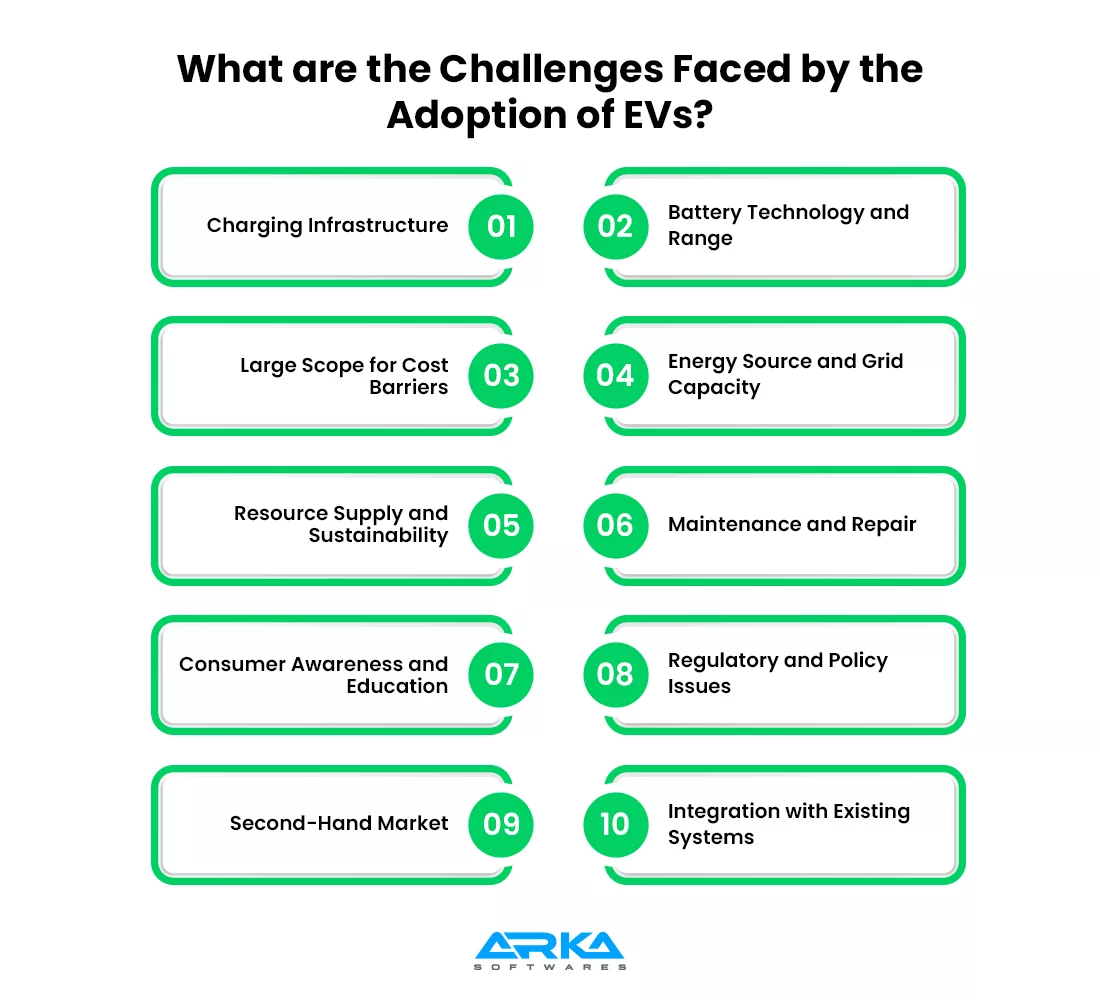
Integrating EVs with existing transportation systems, including public transit and urban planning, is crucial for creating a cohesive and efficient transportation network.
EV Smart energy management can facilitate better integration by optimizing energy use across various modes of transportation and enhances the transportation system’s efficiency.
Smart energy management systems (SEMS) are essential in addressing various challenges associated with energy use, including optimizing the performance of devices like the smart heat pump. Here’s how these smart energy management systems can help overcome these challenges:
SEMS use sensors and data analytics to monitor energy consumption in real time. This helps identify inefficiencies and areas where energy is wasted, allowing for targeted improvements.
They can optimize energy usage based on factors like time-of-day pricing, load balancing, and predictive analytics, reducing overall energy consumption and costs.
SEMS can adjust energy consumption patterns in response to price signals or grid demand, avoiding peak pricing and reducing electricity costs.
Automated systems can adjust lighting, heating, cooling, and other energy-consuming systems to operate more efficiently, lowering energy bills.
SEMS facilitates the integration of renewable energy sources like solar and wind by managing and balancing intermittent energy supplies with consumption needs.
They manage battery storage systems to store excess renewable energy when production is high and release it when production is low.
By balancing energy loads and reducing peak demand, SEMS contributes to overall grid stability, preventing overloads and blackouts.
They help in quickly identifying and addressing issues within the energy system, minimizing downtime and improving reliability.
By optimizing energy usage and integrating renewable sources, SEMS contributes to lower greenhouse gas emissions and a reduced environmental impact.
They promote practices that conserve energy and reduce waste to further support sustainability goals.
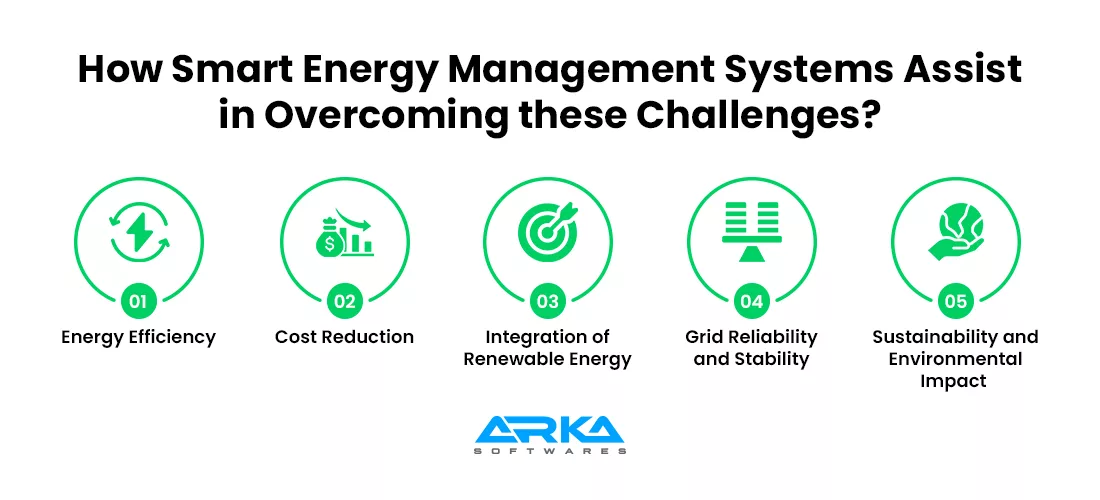
Smart energy management apps for electric vehicles (EVs) offer various benefits that enhance the EV ownership experience. Here’s a detailed look at the key advantages:
An EV energy management system can help you save money on energy costs by scheduling charging during off hours or when electricity rates are lower. These apps also help you avoid overcharging and ensure you’re using energy more efficiently.
With an EV energy management system, you can monitor your vehicle’s current battery level and remaining range to avoid unexpected power outages.
Additionally, this system provides recommendations for routes with charging stations, helping you plan longer trips more effectively and reducing range anxiety.
An EV energy management system offers guidance on best practices for charging and discharging to prolong battery life and maintain its performance.
You’ll also receive notifications about battery health and maintenance needs, allowing you to address potential issues before they become serious problems.
With an EV energy management system, you can start or stop charging, check battery status, and precondition your vehicle (e.g., heating or cooling) from your smartphone, making your EV ready to go when you are.
You can set up charging schedules and notifications to align with your daily routine and preferences; all managed through the EV energy management system.
An EV energy management system allows you to track and analyze your driving habits and energy usage to identify patterns and improve efficiency.
Coordinate EV charging with home energy systems using an EV energy management system to optimize overall energy use, such as utilizing excess solar power to charge your EV.
EV energy management software allows you to monitor your environmental impact and track how much CO2 emissions you’ve saved by driving an EV.
The software also provides tips on how to reduce energy consumption and further lower your carbon footprint, making it a valuable tool for environmentally conscious driving.
With EV energy management software, you can personalize charging settings, notifications, and other features to match your lifestyle and driving patterns.
Enjoy an intuitive interface that simplifies managing your EV’s energy needs, all streamlined through this advanced software.
Connect with other services and apps like parking or navigation to streamline your driving experience and enhance convenience. This integration ensures a seamless connection between your EV’s energy management and broader driving needs.
EV energy management software regularly updates with new features and improvements, allowing you to access the latest advancements in energy management and EV technology.
This software provides ongoing support and updates, allowing you to adjust to changes in your driving habits, energy prices, or EV technology.
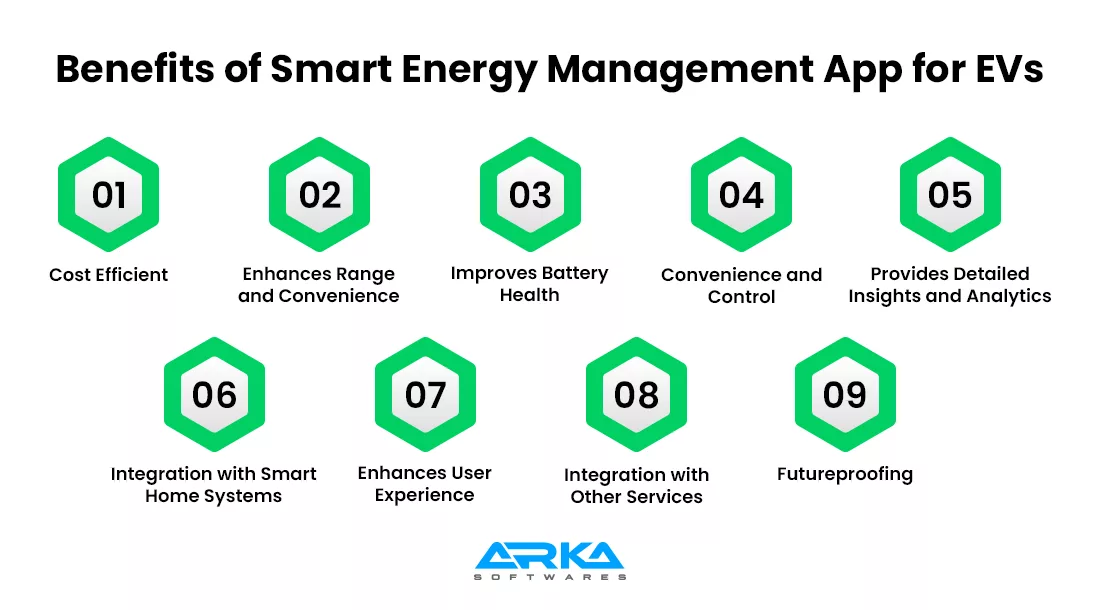
Implementing a smart energy management system (EMS) involves a range of considerations to ensure it operates effectively and efficiently. Here are some key factors to consider:
Define clear goals for energy savings, efficiency improvements, and sustainability. Determine specific objectives, such as reducing peak demand, lowering energy costs, or integrating renewable energy sources.
For example, energy management strategies in EV can include optimizing charging times to reduce costs and emissions.
Ensure the EMS can integrate with existing building management systems (BMS), HVAC systems, lighting controls, and other energy-related infrastructure.
Consider compatibility with protocols and standards (e.g., BACnet, Modbus, Zigbee). Additionally, evaluate how the EV energy management platform can work seamlessly with these systems to enhance overall efficiency.
Implement sensors and meters to collect real-time data on energy consumption, production, and environmental conditions. Accurate and reliable data collection is important for informing decision-making and optimization.
In the context of EV smart energy management examples, real-time monitoring can help optimize charging schedules and reduce energy waste.
Use advanced analytics to identify patterns, inefficiencies, and opportunities for optimization. Develop customizable reporting tools to track performance, savings, and progress toward energy goals.
For EV charging energy management, analytics can help understand usage patterns and make data-driven decisions to improve efficiency.
Design an intuitive user interface for system operators to access and control energy management functions easily.
Provide remote access capabilities in the realm of energy management benefits in EV for monitoring and management from different locations.
User-friendly interface can simplify the management of EV charging stations and their integration into the overall energy system.
Incorporate strategies for managing different energy sources, including renewable sources like solar or wind. Implement demand response mechanisms to adjust energy usage based on grid conditions or pricing signals.
Effective energy management strategies in EV can involve adjusting charging times based on energy demand and availability.
Choose a system that can scale with future growth and adapt to evolving energy needs and technologies.
Ensure the EMS can be easily upgraded or expanded as new features or components become available. Integrating new technologies is crucial for a comprehensive EV energy management platform.
Implement proper cybersecurity measures to protect the EMS from unauthorized access and data breaches. One can ensure compliance with privacy regulations and protect sensitive energy usage data.
This is particularly important in EV smart energy management examples, where sensitive data related to EV usage and charging patterns is involved.
Evaluate the initial investment cost versus long-term savings and benefits. Consider energy savings, maintenance costs, and potential incentives or rebates. EV’s energy management benefits can include significant energy cost savings and improved operational efficiency.
You must ensure the EMS complies with relevant local, national, and international regulations and standards. Stay updated on changes in laws that might impact energy management practices.
This includes understanding EV charging energy management regulations and ensuring adherence to all applicable standards.
It provides comprehensive training for users to operate and manage the EMS effectively. Offer ongoing support and maintenance services to address issues and ensure system performance.
In EV energy management, training can help users understand how to leverage the system for optimal energy use and charging efficiency.
Establish key performance indicators (KPIs) to measure the effectiveness of the EMS. Regularly evaluate performance and adjust as needed to optimize energy management.
For instance, KPIs related to EV energy management software might focus on metrics like charging efficiency, energy cost savings, and reductions in peak demand.
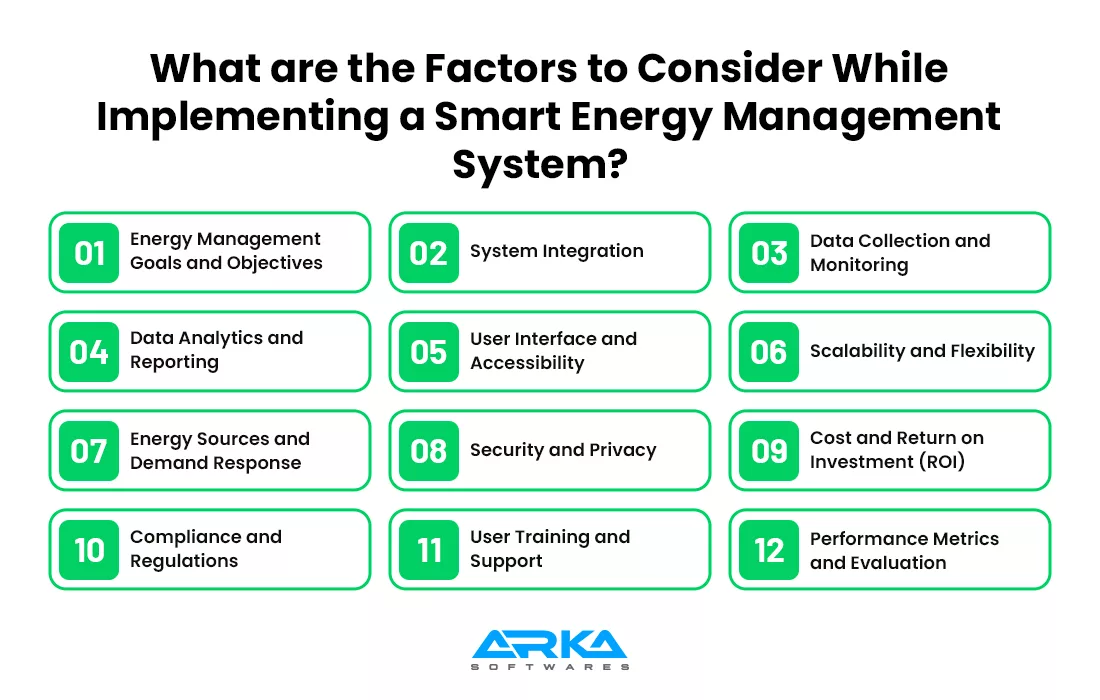
Partnering with us is ideal for developing an advanced energy management system for EV business. We specialize in creating sophisticated EV energy management solutions tailored to your needs.
Our expert developers use the latest technology to deliver a robust app that offers real-time charging updates, comprehensive battery monitoring, and in-depth analytics.
With Arka Softwares, you can transform how energy is managed and consumed in electric vehicles. You can reach out to us for any assistance needed in energy management for EV and to achieve greater efficiency and effectiveness.
EV smart energy management refers to systems that optimize electric vehicle charging and energy use, integrating them with energy grids and home energy systems to enhance efficiency, reduce costs, and support sustainability. It optimizes charging times, adjusts power usage based on grid demand, and integrates renewable energy, enhancing energy efficiency and reducing costs while ensuring effective use of both EV’s and energy resources.
It uses technology like Vehicle-to-Grid (V2G), intelligent charging, and real-time monitoring to optimize when and how EVs are charged, balancing grid demand and incorporating renewable energy sources for efficient energy use. It adjusts charging times, monitors energy use, and uses data to minimize costs and enhance efficiency. This system helps balance load, integrates renewable energy, and supports grid stability.
Custom software development services can tailor EV smart energy management solutions by creating specialized algorithms for optimal charging and grid integration, ensuring compatibility with V2G technology, and enabling real-time data analytics.
EV smart energy management optimizes charging schedules, reduces energy costs, and integrates renewable sources. It enhances grid stability by balancing demand, minimizes energy waste, and supports sustainability goals. This system ensures efficient use of resources and can lower overall electricity expenses for electric vehicle owners.